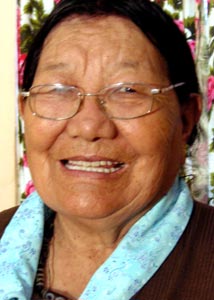Name: Kalsang Yangchen
(Alias: No)
Gender: Female
Interview Age: 78
Date of Birth: 1929
Birthplace: Miling, Kham, Tibet
Year Left Tibet: 1959
Profession: Agriculture
Monk/Nun: No
Political Prisoner: No

Interview No.: 24
Date: 2007-06-30
Language: Tibetan
Location: Lugsung Samdupling Settlement, Bylakuppe, Karnataka, India
Categories: Culture and History
Keywords: childhood memories, children's games, Chinese -- oppression under, Chinese rule -- life under, Chushi Gangdrug guerrillas, escape experiences, farm life, festivals, Kham, medical treatment, refugee in India -- life as, shamans/mediums
Summary:
Kalsang Yangchen played tug-of-war and wrestled with boys as a child, but most of the time she was busy with household chores. After she married a lama from the Ngagpa tradition, she traveled to pilgrimage sites, and received the Kalachakra blessing given by His Holiness the Dalai Lama at Norbulingka Palace. Kalsang Yangchen's husband was a traditional doctor as well as a Ngagpa, who are believed to possess special tantric powers, such as controlling rainfall, taming and vanquishing souls which have risen after their death, and curing mental and physical illness. Kalsang Yangchen describes a few of these practices in detail.
Kalsang Yangchen's husband joined the Chushi Gangdrug Volunteer Force and shot a Chinese army leader. To avenge their leader's death the Chinese planned to capture and disembowel Kalsang Yangchen if they could not find her husband. After the Dalai Lama escaped to India, the Chushi Gangdrug guerrillas began to flee and took Kalsang Yangchen with them. She was separated from her husband, who went off to battle the Chinese again, and she continued on to India. She was later reunited with her husband in Missamari.
Interview Team:
- Rebecca Novick (Interviewer)
- Ronny Novick (Videographer)
- Tenzin Yangchen (Interpreter)

